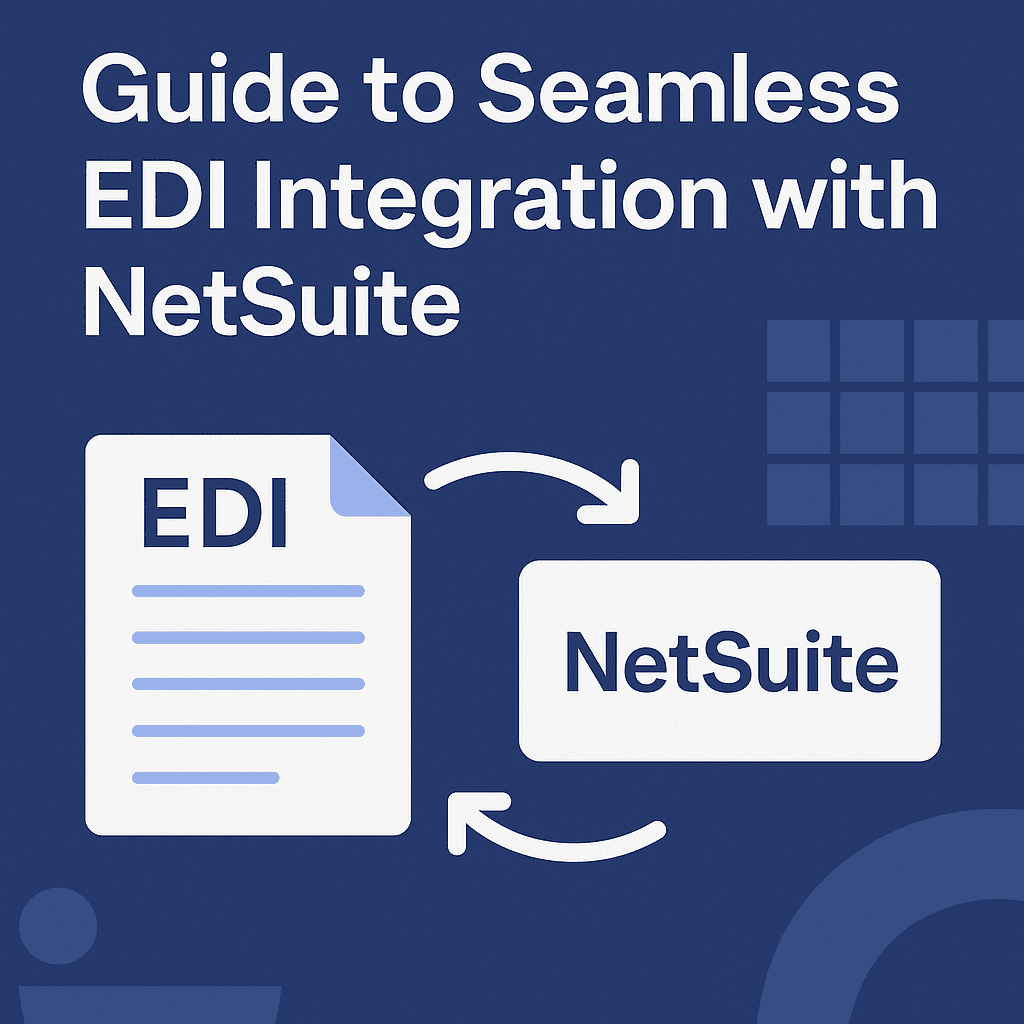Streamline your NetSuite EDI integration with Orderful. Reduce manual work, accelerate onboarding, and scale operations with a modern, API-first solution.
NetSuite has become the ERP of choice for fast-scaling businesses, but when it comes to electronic data interchange (EDI), many companies hit a wall. NetSuite doesn't include native EDI functionality, which means you'll need an external integration to automate purchase orders, invoices, and shipping notices with your trading partners.
The right EDI integration eliminates manual data entry, speeds up partner onboarding, and helps you scale without adding headcount. This guide covers what you need to know about NetSuite EDI integration, common challenges, and how to choose the right solution.
About Orderful
Orderful is a modern EDI platform built for cloud ERPs like NetSuite. We help growing businesses automate EDI in under 9 days with prebuilt integrations, flat per-partner pricing, and access to 10,000+ pre-connected trading partners. Unlike legacy EDI providers, we eliminate transaction fees, custom development, and lengthy implementations so you can onboard retailers like Walmart, Target, and Amazon faster than any other platform.
Why NetSuite Needs EDI Integration
NetSuite excels at financial planning, inventory management, and order processing. But without EDI, you're stuck manually importing orders, creating invoices, and managing shipments across multiple systems.
EDI integration connects NetSuite directly to your trading partners, automating the exchange of critical business documents like:
- Purchase orders (850) – Automatically create sales orders in NetSuite from retailer POs
- Invoices (810) – Send invoices to customers without manual data entry
- Advance ship notices (856) – Automate ASNs for Walmart, Target, Amazon, and other major retailers
- Shipping confirmations (214) – Update trading partners on shipment status in real time
With EDI, NetSuite becomes a connected hub for your entire supply chain, eliminating bottlenecks and keeping operations running smoothly.
Common NetSuite EDI Integration Challenges
1. Data Mapping Complexity
Different trading partners use different EDI standards (ANSI X12, EDIFACT, XML). Mapping these formats to NetSuite's data structure manually is time-consuming and error-prone.
Solution: Choose an EDI provider with prebuilt NetSuite connectors and automated data transformation.
2. Slow Partner Onboarding
Each new retailer or supplier requires custom EDI setup, testing, and validation. Without the right tools, onboarding can take weeks or months.
Solution: Look for platforms with pre-connected trading partner networks (10,000+ partners) that accelerate onboarding to days instead of weeks.
3. Lack of Real-Time Visibility
When EDI errors occur, many businesses don't find out until after documents are rejected, causing delays and chargebacks.
Solution: Use an EDI platform with real-time monitoring, error alerts, and validation before documents are sent.
4. Migration Complications
If you're migrating to NetSuite from another ERP, integrating EDI during the transition adds complexity. Misaligned data structures and trading partner delays can stall your go-live.
Solution: Work with an EDI provider experienced in NetSuite migrations who can run parallel systems during cutover and validate data flows before launch.
5. Limited In-House EDI Expertise
EDI integration requires knowledge of data mapping, trading partner requirements, and communication protocols. Most NetSuite users don't have dedicated EDI teams.
Solution: Partner with a managed EDI provider that handles onboarding, testing, and ongoing maintenance so your IT team can focus on core business systems.
What to Look for in a NetSuite EDI Provider
Choosing the right EDI provider makes the difference between a smooth implementation and months of delays. Here's what matters most:
Prebuilt NetSuite Integration
Custom integrations can take 3-6 months and cost $50,000-$150,000. Look for providers with native NetSuite connectors that work out of the box, reducing implementation time to days or weeks instead of months.
Trading Partner Network
Providers with extensive pre-connected networks eliminate custom mapping for each new retailer or supplier. If you're working with major retailers like Walmart, Target, or Amazon, those connections should already be built.
Transparent Pricing
Legacy EDI providers often charge per-transaction or per-kilocharacter, making costs unpredictable as you scale. Modern EDI platforms typically offer flat per-partner pricing with unlimited transactions, giving you predictable costs as you grow.
API-First Architecture
Middleware platforms that rely on flat-file transfers create unnecessary complexity. API-first EDI solutions connect directly to NetSuite via REST API, enabling real-time data exchange without manual syncing.
Real-Time Validation
Chargebacks from retailers average $100-$500 per incident. Choose a platform that validates EDI documents before transmission to catch errors early and prevent compliance penalties.
Implementation Timeline
Ask potential providers: "How long until we're live with our first trading partner?" If the answer is longer than 2-3 weeks, keep looking. Modern EDI platforms should get you operational in under 9 days.
NetSuite EDI Integration Use Cases
Retail and Ecommerce
Sellers on Amazon, Walmart, and Target use EDI to automate order processing and meet strict compliance requirements. EDI integration ensures accurate ASNs, on-time shipments, and avoids costly chargebacks.
3PL and Logistics Providers
Third-party logistics companies need EDI to communicate with clients and carriers. NetSuite EDI integration automates shipment updates, inventory tracking, and billing across multiple warehouses.
Manufacturing and Distribution
Manufacturers rely on EDI for purchase orders, shipping notices, and inventory replenishment. Integrating EDI with NetSuite streamlines procurement, production planning, and fulfillment.
Food and Beverage
Companies in this industry face strict labeling, traceability, and compliance requirements. EDI integration helps meet retailer mandates while maintaining accurate inventory records.
The True Cost of Delaying NetSuite EDI Integration
Many NetSuite users continue with manual processes longer than they should, not realizing what it's actually costing them:
Manual Data Entry
If you're processing 50 orders per day manually at 10 minutes each, that's 8+ hours of data entry daily. At $25/hour loaded cost, you're spending $52,000+ annually just on order entry.
Chargebacks and Compliance Penalties
A single late or incorrect ASN can result in $100-$500 chargebacks from major retailers. If you're getting chargebacks monthly, that's $1,200-$6,000+ annually per trading partner.
Lost Revenue Opportunities
Many retailers require EDI before they'll do business with you. Every month without EDI is a month you can't pursue new retail partnerships or respond to RFPs.
Slow Scaling
Without EDI automation, adding each new trading partner means hiring more staff to handle order entry. EDI eliminates this bottleneck, letting you scale revenue without proportional headcount increases.
Why Orderful for NetSuite EDI Integration
Orderful is built for modern cloud ERPs like NetSuite. Our API-first platform connects directly to NetSuite, eliminating middleware and accelerating partner onboarding.
With Orderful, you get:
- Prebuilt NetSuite integration – Go live in days, not months
- 10,000+ pre-connected trading partners – No custom mapping for major retailers
- Real-time validation – Catch errors before documents are sent
- Flat per-partner pricing – Unlimited transactions with no surprise fees
- Migration support – Seamlessly transition from legacy EDI systems during NetSuite implementation
Whether you're migrating to NetSuite, expanding your trading partner network, or looking to eliminate manual processes, Orderful provides the speed, simplicity, and scalability you need.
Book a Demo to see how Orderful integrates with NetSuite.

